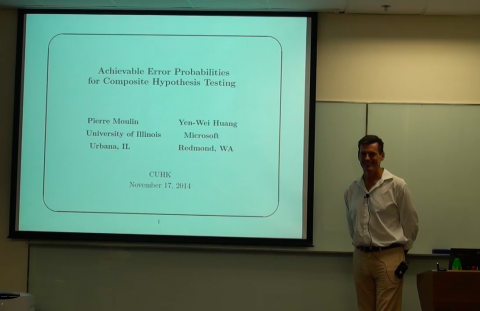
Consider binary hypothesis testing with a null hypothesis H0 against an alternative hypothesis H1, where the alternative distribution is partially unknown. For instance the null distribution could be N(0,1), and the alternative distribution either N(-1,1) or N(2,1). Other applications can be found in network communications. The above problem is called testing a simple hypothesis against a composite hypothesis, and is often approached using a Generalized Likelihood Ratio Test (GLRT). Namely, the “most likely” distribution is estimated, and then plugged into a Likelihood Ratio Test. The GLRT is known to perform well in many settings, and in some cases satisfies asymptotic optimality properties (as the number of observations tends to infinity).
In this talk we consider a finite number of alternative distributions (2 in the example above), fix the significance level of the test (fix the probability of false alarm), and ask the following fundamental question: what are the achievable type-II error probabilities for any nondominated test (aka generalized Neyman-Pearson test), what are the achievable error type-II probabilities for GLRTs, and what are the achievable error type-II probabilities for a new family of tests which we term Likelihood Ratio Threshold Tests (LRTTs). We consider an asymptotic setting with n iid observations and regularity assumptions, and show that GLRTs are generally strongly suboptimal while LRTTs are nearly optimal. Several extensions of the basic framework will be discussed while
LRTTs are nearly optimal. Several extensions of the basic framework will be discussed, including Bayesian hypothesis testing.
Pierre Moulin received his doctoral degree from Washington University in St. Louis in 1990, after which he joined at Bell Communications Research in Morristown, New Jersey, as a Research Scientist. In 1996, he joined the University of Illinois at Urbana-Champaign, where he is currently Professor in the Department of Electrical and Computer Engineering, Research Professor at the Beckman Institute and the Coordinated Science Laboratory, and affiliate professor in the Department of Statistics.
His fields of professional interest include image and video processing, compression, statistical signal processing and modeling, media security, decision theory, and information theory.
Dr. Moulin has served on the editorial boards of the IEEE Transactions on Information Theory, the IEEE Transactions on Image Processing, and the Proceedings of IEEE. He currently serves on the editorial board of Foundations and Trends in Signal Processing. He was co-founding Editor-in-Chief of the IEEE Transactions on Information Forensics and Security (2005-2008), member of the IEEE Signal Processing Society Board of Governors (2005-2007), and has served IEEE in various other capacities.
He received a 1997 Career award from the National Science Foundation and an IEEE Signal Processing Society 1997 Senior Best Paper award. He is also co-author (with Juan Liu) of a paper that received an IEEE Signal Processing Society 2002 Young Author Best Paper award. In 2003 he became IEEE Fellow and Beckman Associate of UIUC’s Center for Advanced Study.
In 2007-2009 he was Sony Faculty scholar at UIUC. He was plenary speaker for ICASSP 2006, ICIP 2011, and several other conferences.
He was Distinguished Lecturer of the IEEE Signal Processing Society for 2012-2013.
